- Home
- Brian Jacques
Voyage of Slaves Page 3
Voyage of Slaves Read online
Page 3
The top floor of the house was open to soft breezes flowing in from the nearby Mediterranean Sea. The large room was opulently furnished. Pattern mosaic tiles decorated the walls, silk hangings rippled in the breeze. The floor was strewn with many precious rugs, some of which had come from far Cathay.6 Slender columns of roseate marble supported the frescoed ceiling. Small decorative palmettos and flowering plants were much in evidence, with parrots and cockatoos wandering about amidst them. At the centre of the room, perfumed rosewater tinkled pleasantly into the scooped-out base of an alabaster fountain, where ringed doves perched on the basin’s edge. Next to this was a sumptuous divan of ivory, ebony, and patterned damask satin, which had once graced the saloon of a sultan’s ship. Now its new owner sat on it in solitary splendour. This was Al Misurata, the most feared pirate on the Barbary Coast.
Al Misurata was only a name he had taken from that region he had called home for three decades. Nobody knew his proper name, or where he had come from. In reality he was the son of a Moroccan servant girl and a Turkish janissary.7 He had embarked on a career of piracy in his youth. From there he had plundered and murdered his way to infamy.
Al Misurata was a man in his fifty-third year. Tall, lean and cruelly handsome, his dark, hooded eyes and curved nose gave him the visage of a hungry desert hawk. Dressed all in purple silks, and carrying a sword made from the finest Toledo steel, he was a captain of captains, a figure to obey without question or argument.
He heard Bomba enter the room, but did not concern himself with turning to greet him. Sipping lemon sherbet from a thin crystal goblet, the pirate sat admiring his supple burgundy boots of best Cordovan leather. He waited until the slave driver addressed him.
“Lord, I have brought thee four fine specimens. A girl from the Isle of Crete, sweet-natured and pretty. Also three boys—an Egyptian, another from Sardinia and a blue-eyed Frank, light-skinned with fair hair. They are all sound in wind and limb, healthy and fit . . .”
Al Misurata silenced Bomba with a single glance. “I will judge them myself. No doubt you stole them all?”
The slave driver spread his arms, smiling and shaking his head. “Alas, no, lord, all were bought with thy gold.”
Al Misurata put aside his goblet, extending a hand. Bomba dug the chamois purse from his wide belt and placed it on the pirate’s palm. Al Misurata tossed it up and down a few times, gauging its weight.
“If they are as good as you say, you did well.”
Bomba made an overelaborate bow, touching his fingers to his lips and forehead. “I live but to serve thee, Master!”
The pirate threw him the purse. “Keep it!”
Bomba’s eyes shone greedily. “No man is more munificent than the great Al Misurata, Lord of the Barbary Coast . . .”
The pirate cut him short. “Go now, bring them here in the cool of the evening. I will see them then!”
It was mid-noon. Ben sat with the other two boys and the girl in the shade of the wall, under the watchful eye of the guard. They were all clean, even their clothing, which had dried out quickly in the fierce heat. The stern woman came out of the big house, with another younger one in tow. Between them they carried a basket of fruit—dates, figs, oranges, pomegranates and a big yellow melon, which had been cut into slices. They placed the basket at their feet.
“Eat now, and try to stay clean!”
Ben chose a slice of melon, nodding gratefully to her. “Thank you. What do they call this place, who owns it?”
The older woman rapped Ben’s back with her stick. “I said eat, not talk. One more word from you, boy, and you will feel how I can really use this rod!” She stared at the strange, fair-haired lad for a moment, then turned and strode back to the house.
Evening arrived, tempering the heat by drifting sea breezes over the land. Ben and the other three captives were herded into the upper room by Bomba. They stood bewildered, trying to take in the splendour surrounding them. Al Misurata watched them from his divan. Standing behind him, the stern-faced Jasmina leaned forward. Whispering in his ear, she pointed at Ben. The pirate nodded toward the boy, and Bomba shoved him forward. Al Misurata spoke in French to Ben. “Tell me, infidel, do you have rich parents?”
Ben replied in fluent French. “I have nobody but myself, my parents are long dead. Sir, it is a crime against my god and yours to buy and sell human beings. Slavery is a wicked thing.”
Al Misurata had a smattering of many languages. He replied to the boy’s accusation in English. “I serve no god. My sword and my wits provide me with gold, that is all Al Misurata, Lord of the Barbary Coast, needs. How is it that you can speak in other tongues, O Defender of the Righteous?”
Ben answered the ironic question in English. “I have always had a good ear for languages. I pick up things here and there, it’s not hard.”
Al Misurata pointed to the other three slaves. “Ask them if they have wealthy families who would want to ransom them.”
Ben translated the enquiry to Lucia, Omar and Sandro. One by one they shook their heads in silence.
The pirate switched back into Arabic. “So, they are all worthless beggars. What do you suggest I do with them, boy?”
Ben was not afraid of the Barbary pirate. He replied promptly, “Why do you ask me? You have captured us, and you are going to sell us into slavery, to obtain the gold which you worship. But someone once said to me that in the end, gold can only buy you an expensive coffin and a great marble tomb.”
Bomba leaped forward, raising his quirt to strike the boy down for his insolence. However, Al Misurata stopped him in his tracks with a single glance. “Take these others and lock them away for the night. The infidel boy stays here with me. Go!”
The slave driver bowed and ushered his charges away.
Al Misurata stroked his forked beard, studying Ben intently. “What is your name, and how old are you?”
The boy’s strange blue-grey eyes stared solemnly back at his captor. “I am called Ben, nothing else. As for my age, I’m not really certain.”
The Barbary pirate’s eyes narrowed. “I think you are about fourteen years of age, but about two hundred in the head, eh?”
Ben shrugged. “I suppose so, but my head isn’t much over a hundred, certainly not two.”
Al Misurata smiled thinly, indicating a round table nearby. It was piled high with food for his evening meal. “You are a remarkable boy, not like the usual peasant clods Bomba brings here. Do you want food? Take some, it is very good. Come on, I never yet met a young one who was not hungry. Jasmina, give him a plate.”
The hard-faced Libyan woman scowled. “I would as soon give him a back marked with stripes for his insolent tongue!”
Al Misurata raised his hand imperiously. “Silence, woman, you forget yourself! I am the master and you are the slave. Take yourself out of my sight!”
Clasping her hands, Jasmina bowed low. She glided wordlessly away. Ben hesitated for a moment, then hurried to the table. Taking two circles of flat, unleavened bread, he made a hefty sandwich with slices of warm, roasted lamb and cooked yellow peppers. Biting into it, the boy chewed ravenously—the food tasted magnificent.
The pirate nodded approvingly. “When a man is wealthy, only the best is good enough. Look at this room, is it not splendid?”
Ben’s mouth was crammed, but he nodded agreement.
Filling one of the fine crystal goblets with a lemon sherbet cordial, Al Misurata passed it to him. “I could use a boy like you, bright and intelligent. You could serve me in this house, be my eyes and ears, tell me who are my friends and who are my enemies. It would be a life of luxury, you would want for nothing.”
Ben cleared his mouth before answering. “Except freedom.”
The pirate’s mood changed like lightning at this remark. Rising angrily, he strode to the long, open windowspace, taking in the lands outside with a sweeping gesture. “Fool, what do you know about freedom? Hah, beggars in soukhs and bazaars, shaking their bowls! Men breaking their backs at har
d labour! Women scavenging the fields and the shores! For what? Just to feed themselves and their ragged brats! Toiling like animals from dawn ’til dusk as they pray for their gods to help them! You call that freedom? Only gold can truly buy the power to give any man freedom. That is the real truth, is it not? Answer me, infidel!”
Ben knew he would further enrage the man by arguing, yet he carried on, defending his right to reply. “The truth is that those poor folk cannot sleep safe at night, knowing men like you might come and sell them into slavery. Yet look at the freedom you have bought by trading in human beings. You want me to serve you by spying upon those in your own home. I pity you, with neither god nor real friend to turn to. Gold will never buy you that.”
The enraged pirate struck Ben across the face, the crystal goblet shattered on the floor. Food scattered into the fountain, parrots squawked and doves fluttered wildly to the ceiling as Al Misurata shouted.
“Guards, get this infidel out of here! Chain him in the cellars without food or drink!”
Two burly sentries rushed in; seizing Ben roughly, they dragged him from the room. The pirate followed them to the door, venting his spleen on the boy.
“Ungrateful worm, now you will know what it is like to be a slave! I have killed men with my bare hands for saying less than you did to me! That’s what I get for offering you the hand of friendship, eh? Before I am done you will be begging on your bended knees to serve me without question!”
The cellar door swung open, and Ben was hurled inside. He clattered down a flight of stone steps into complete blackness. The guards barred the door, one of them calling down to him, “Little jackass, we’ll see if you still feel so bold in a week or so. If you make a sound in there we’ll send Bomba to silence you with his quirt!”
Ben heard their retreating footsteps. Then there was only silence, and inky darkness. A large insect scuttled over his hand. He crawled forward until he felt the wall. Sitting with his back against the rough limestone, he buried his face in both hands and wept uncontrollably. “Ned, where are you? Answer me, Ned, answer me!”
5
CONTRARY TO LA LINDI’S PREDICTION, Ned did live to see the sunset, though he slept deeply for most of the day. He came awake in the dark, still sprawled upon the wagon step. Not far from him, the troupe sat around the fire, eating their supper. Savoury aromas from a cauldron over the flames fanned hunger pangs within the black Labrador. He had no recollection of when he had last eaten, nor of anything else in his life before he had been washed up on the Libyan shores. Driven by hunger, Ned tried to stand. His legs buckled under him, and he fell flat on the sand.
Mummo was stirring the contents of the cauldron when he saw the dog fall from the wagon step. “Look, Otto, your dogfish has come to life!”
Serafina grabbed a rug and ran to Ned’s side, spreading it. “Otto, lift him onto this, it will keep the sand from his coat. Poor Bundi, your legs aren’t working properly yet, but you’re nice and clean, all soft and silky.”
The big German lifted Ned easily onto the rug. He began massaging his dog’s ears fondly. Ned grunted with pleasure. The strongman murmured soothingly, “Ja, mein Herr,8 Bundi, you will soon be well again, won’t you, old fellow? Watch his eyes, Serafina, I think he’s trying to thank us for saving his life!”
Bringing her face close, the girl peered into Ned’s eyes. “Oh, I’m sure he is, just look at those wonderful eyes, Otto.”
If Ned could have spoken, he would have returned the compliment a hundredfold. The girl Serafina was the most beautiful human being he had ever encountered. Reflecting the fireglow, her skin shone like polished black marble, her teeth were white as fresh milk; as for her eyes, Ned judged that any comparison with his was out of the question. The girl’s eyes were almost almond-shaped, and they were very large. Twin dark, starlit orbs, in settings the hue of old ivory. He was captivated by the warm, husky sound of her voice.
“Poor Bundi, you must be hungry.”
“Hungry?” Ned thought. “I could eat my own tail, uncooked!”
The strongman passed Serafina a bowl. “Try him with this, Mädchen,9 it’s a raw egg beaten in goat’s milk. I put a pinch of salt in, it should do him good.”
Serafina held the bowl to Ned’s mouth, restraining him slightly to prevent him gulping it. The Labrador took it all, licking the bowl and the girl’s fingers thoroughly. She patted his head. “Good boy, Bundi, we’ll try you with something more solid tomorrow.”
Ned gave her fingers an extra lick. “Thank you, pretty miss, I’ll look forward to it!”
Supper being over, and the fire burning to embers, the troupe prepared for rest. Mamma Rizzoli and La Lindi went inside the tented wagon, telling Serafina not to sit up too late with the dog. Buffo, Mummo, and Otto lay under the cart, wrapped in long Arab robes. Signore Rizzoli attended to Poppea, covering the mare with a blanket, tying her running line to a cart wheel, and leaving her a pail of fresh water nearby. “Rest now, my noble lady, we move on tomorrow.”
Donning a long Italian army officer’s greatcoat with caped shoulders, the showman went to sit beside Serafina. “You need your sleep, piccina,10 so does your Bundi by the look of him. We’ll be travelling tomorrow.”
The girl rubbed her eyes. “I’m going into the wagon soon. Look, Signore, Bundi is nodding off, too. See how sad his eyes are? He looks completely lost. I wonder whose dog he is, and how he came to be here with us.” Serafina gave Ned a final pat, then went into the wagon.
Through drooping eyelids Ned stared up at the Mediterranean night sky. It was moonless, but pierced by twinkling pinpoints of countless stars. A comet blazed its path across the dark vaults, the brief, flaming brilliance almost instantly gone amid the uncharted heavens. The black Labrador’s eyes closed. Soon he was lost in the clouded seas of forgetfulness, with no knowledge of his past, his master, or any of the events which had brought him to this far shore.
Sounds of distant seabirds greeted the dawn as waves broke endlessly over the Libyan coast. Ned wakened to view the broad, freckled back of Herr Otto Kassel, going off for his morning swim and exercise. Thirst was the uppermost thought in the dog’s mind—he needed water. Feeling much better than he had on the previous day, Ned rose shakily. Once he found he could stay upright, he ventured carefully over to the pail of water near the horse. Poppea was still asleep, so he drank his fill gratefully. Feeling greatly refreshed, he decided to make himself helpful to his benefactors, and set off at a sedate pace along the shore to seek out firewood.
Mamma Rizzoli was the first of the ladies up and about. She bustled out of the wagon and went to stir up the fire embers. The good lady was surprised to see a small heap of driftwood lying beside the remains of last night’s fire. Then she spied the dog. Ned was coming up from the tideline, head held to one side as he tugged along the broken shaft of a large oar he had found. Mamma watched him bring it right to her. She smiled broadly, hugging the dog’s neck.
“Good Bundi! Good boy! What a clever dog you are!”
She roused the troupe as she banged on the side of the wagon, calling to Serafina, “Bella mia,11 see what your dog is doing, bringing wood for the fire. What a fine fellow he is!”
Buffo stopped Ned going off for more. He shook the dog’s paw heartily. “Grazie, amico.12 Here, let me cook you a good breakfast, truly you are a dog among dogs!”
Ned suddenly felt better than he had for quite awhile. He went from one to another, wagging his tail furiously as they patted and complimented him. Otto arrived back and was told of the black Labrador’s cleverness. The strongman picked Ned up, as though he weighed nothing, and hugged him. Tears flowed openly from the big German’s eyes, for he was an extremely sentimental man.
“I knew he would get well. This is a great dog we have, Serafina. Bundi the Great!”
Ned sat between Serafina and Otto, eating toasted bread and an omelette, which Buffo had cooked specially for him. The atmosphere was jovial and carefree, with Signore Rizzoli dropping broad hints.
&n
bsp; “Serafina, do you think you could teach him some tricks? Maybe you could do an act together. What do you think, Signore Bundi, we’ll feed you well and give you a nice place to sleep. Well, what do you think, my friend?”
To everyone’s surprise and delight, Ned held out his paw. Buffo shook it heartily.
“See, I think Bundi wishes to join us. Be careful, Augusto, this good fellow will be doing your job soon!”
Signore Rizzoli raised his eyebrows comically. “Listen, brother, if it comes to a contest, the dog will have replaced you before nightfall!”
Mamma stroked the black Labrador. “Oh, you’re a clever dog, but I don’t think you could sing or play as sweetly as my husband. Show him, caro.”13
Signore Rizzoli fetched a mandolin from the cart. He tuned it briefly, and soon his fine tenor voice was ringing out as he sang and played an old travellers’ melody.
“See now this land, ’tis nought like my home, not as green as the fields I knew, where the sky was a softer blue.
Tired now and slow, down the dusty road I roam, growing older with every day, trudging on in my weary way, far from the country I love. O play mandolino play oh!
“Say now my horse, ah trusty old friend, do you miss the cool winding streams?
Quiet spots where we dreamed our dreams, pulling our cart, down a track which has no end, wand’rers caught on the wheel of fate, swept along with the wind too late. far from the country I love. O play mandolino play oh!”
Ned threw back his head, howling along with the last notes of the tinkling mandolin. Serafina giggled.
“What a lovely harmony our Bundi sings, eh, Signore?”
Augusto Rizzoli clutched the mandolin to his chest. “Maybe he does, bella mia, but keep him away from this instrument. It belonged to my pappa, and Signore Bundi might scratch it if he tried to play it!”

 The Long Patrol
The Long Patrol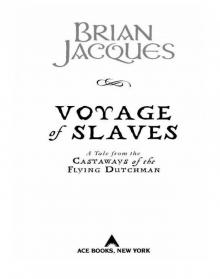 Voyage of Slaves
Voyage of Slaves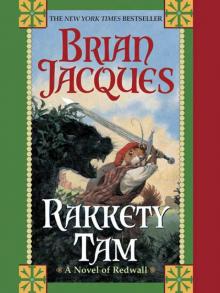 Rakkety Tam
Rakkety Tam Pearls of Lutra
Pearls of Lutra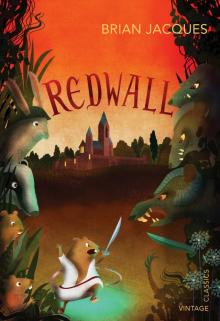 Redwall
Redwall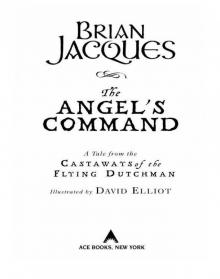 The Angel's Command
The Angel's Command Mossflower (Redwall)
Mossflower (Redwall) Marlfox (Redwall)
Marlfox (Redwall)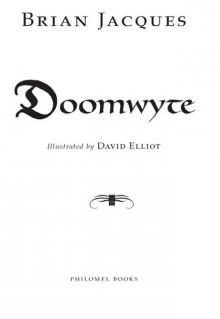 Doomwyte
Doomwyte Martin The Warrior (Redwall)
Martin The Warrior (Redwall)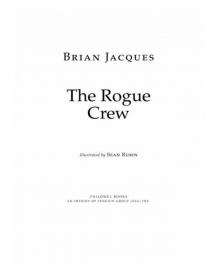 The Rogue Crew
The Rogue Crew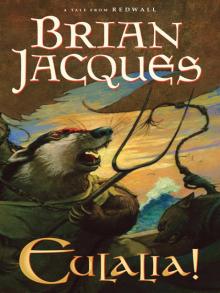 Eulalia!
Eulalia!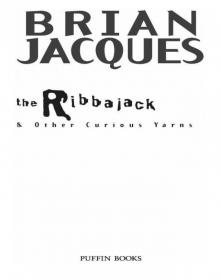 The Ribbajack: And Other Haunting Tales
The Ribbajack: And Other Haunting Tales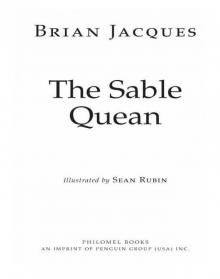 The Sable Quean
The Sable Quean The Bellmaker
The Bellmaker Lord Brocktree
Lord Brocktree The Legend of Luke
The Legend of Luke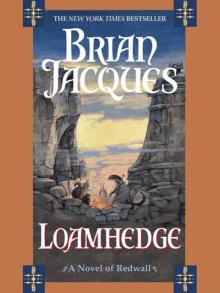 Loamhedge
Loamhedge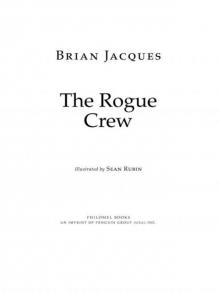 The Rogue Crew: A Tale of Redwall
The Rogue Crew: A Tale of Redwall![[Redwall 18] - High Rhulain Read online](http://i1.bookreadfree.com/i/03/23/redwall_18_-_high_rhulain_preview.jpg) [Redwall 18] - High Rhulain
[Redwall 18] - High Rhulain The Pearls of Lutra
The Pearls of Lutra Salamandastron (Redwall)
Salamandastron (Redwall)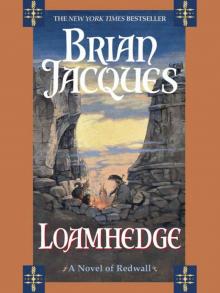 Loamhedge: A Novel of Redwall
Loamhedge: A Novel of Redwall Outcast Of Redwall
Outcast Of Redwall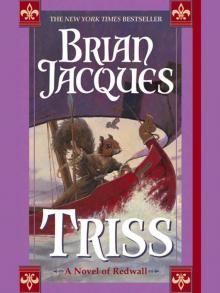 Triss: A Novel of Redwall
Triss: A Novel of Redwall The Taggerung (Redwall)
The Taggerung (Redwall)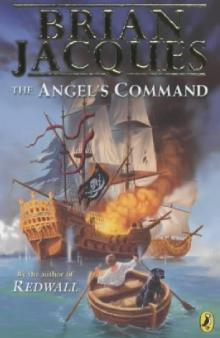 The Angel's Command fd-2
The Angel's Command fd-2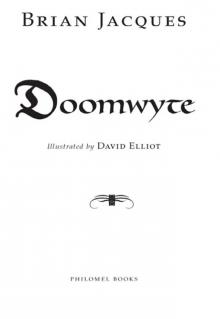 Doomwyte (Redwall)
Doomwyte (Redwall)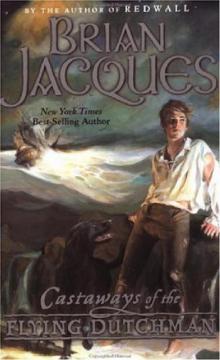 Castaways of the Flying Dutchman fd-1
Castaways of the Flying Dutchman fd-1![[Flying Dutchman 01] - Castaways of the Flying Dutchman Read online](http://i1.bookreadfree.com/i1/04/07/flying_dutchman_01_-_castaways_of_the_flying_dutchman_preview.jpg) [Flying Dutchman 01] - Castaways of the Flying Dutchman
[Flying Dutchman 01] - Castaways of the Flying Dutchman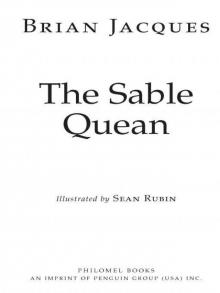 The Sable Quean (Redwall)
The Sable Quean (Redwall) The Bellmaker (Redwall)
The Bellmaker (Redwall) Mariel Of Redwall
Mariel Of Redwall Mattimeo (Redwall)
Mattimeo (Redwall)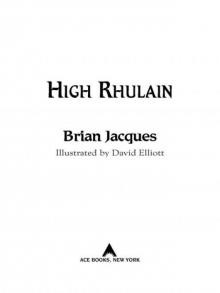 High Rhulain (Redwall)
High Rhulain (Redwall)